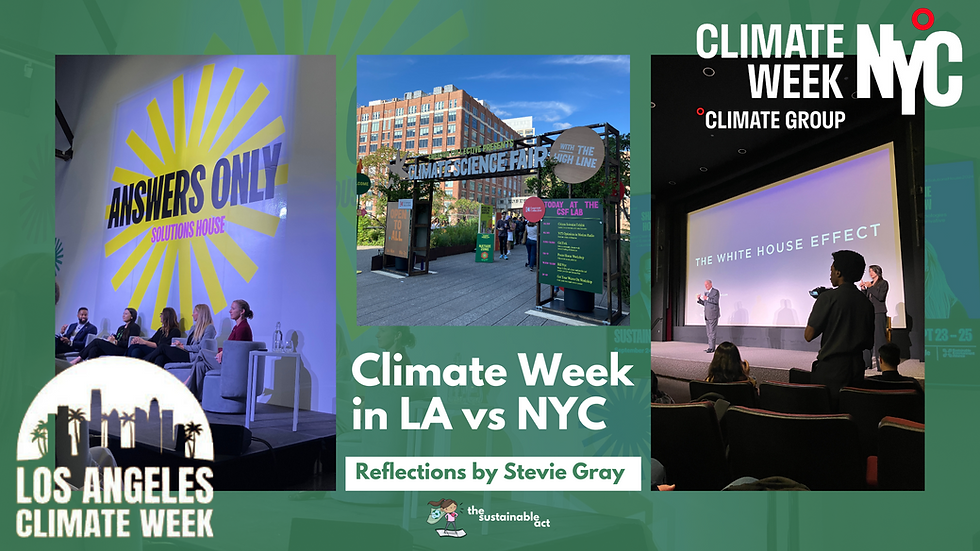Why Climate Action Will Persist Despite Trump’s Presidency.
- Madeline Medensky

- Nov 15, 2024
- 3 min read
A week ago, Americans elected Donald Trump as their 47th President of the United States, casting doubt about the future of climate action under another Trump presidency. Another term under Trump’s leadership raises critical questions about the future of climate action: What does it mean to have a president who avidly supports increased fossil fuel consumption? What will it mean to have a President who denies the existence of climate change, thus reversing important policy work and regulations?
Global Efforts Can’t Be Halted Altogether
While the Trump presidency might roll back on actions outlined in the Inflation Reduction Act, Biden’s bill that ensures significant funding to support the clean energy transition, climate change concern remains high, and even vastly underestimated. Global concern for climate change will continue to drive action, as no single individual can halt this movement entirely. Even more, the word of advocacy groups and coalitions will be that much more important going forward, with Trump’s presidency even signaling a growing strength as many more feel compelled by the cause. In addition, the move to clean energy will downplay much of Trump’s “drill, baby, drill” comments. Trump’s push for increased oil drilling clashes with the global momentum toward clean energy. Clean energy investments now surpass those in fossil fuels, highlighted by the establishment of nuclear facilities to meet growing energy demands, including powering AI technologies. In other ways, more consumers are making proactive choices to invest based on sustainable measures outlined in stock and index fund portfolios. With all of these factors in mind, it’s important to consider what’s also going on in North America and abroad that offers some clarity in how climate action, regardless of political movements, is still an ongoing and defiant cause.

State and Local Communities Still Play a Part in Climate Action
Despite federal rollbacks that might take place, state and local communities, in the United States and elsewhere, are determined to forge ahead with sustainable policies. Communities all over the world are designing and revamping public spaces, policies, and mandates to fit along more sustainable guidelines. Urban planning in U.S. cities like Denver and San Diego is shaping a more sustainable future by expanding bike lanes and promoting the use of sustainable materials in cafes and shops. Also take other global cities that convey the ethos of sustainable development like Vancouver that is committed to eco-friendly policies like the Greenest City Action Plan which seeks to double the number of green and local food jobs, and encourage businesses to go green in their operations.
Support for Sustainable Energy Will Survive Based on Its Economic Sense
First, the fact that trillions of global investment money goes towards sustainable research and implementation is crucial in understanding how and why the idea behind more extraction of fossil fuels makes no economic sense. Investment entities, as well as individual investors, seek alternatives to big oil companies when it comes to building their financial portfolio.
Moreover, the push to secure new natural resources outweighs any significant return to fossil fuels. Adam Morton writes in the Guardian that, “[the focus is ] on non-fossil fuel energy: it has grown dramatically over the past five years, increasing by nearly two-thirds, and is forecast to reach US $2tn this year. Most of the spending is on renewable power and energy efficiency, with support for energy grids and storage making up a smaller chunk and nuclear a much smaller piece again.”

All of this sets the backdrop for COP29 (the United Nations Climate Change Conference) currently taking place in Baku, Azerbaijan. International orders will come to effect as China eyes more investment in renewable energies, especially under the next Trump administration. China aims to secure strategic advantages in renewable energy investments, particularly as the U.S. risks falling behind on climate mandates. All of these relationships will come to play in Trump’s envisioning of a renewed national economy.
The Hard Problem Awaits
Of course, policy advocacy and increased coalitions committed to implementing sustainable practices will have to contend with the attitudes and opinions of citizens shaped by the government’s resistance to recognize climate change as a serious matter. While Trump’s stance as a climate change denier persists, the responsibility falls on advocacy groups, journalists, and research institutions to advance awareness and emphasize the benefits of sustainable practices for global communities.
About the Author:

Madeline Medensky
Madeline Medensky is a content writer and editor based in Canada. She was recently the Public Relations Specialist for the University of Waterloo's Hub for Sustainability Integration where she reported on sustainability implementation for business development and economic change. Madeline's content expertise extends to other positions and opportunities in the tech sector. In her spare time, she exercises her storytelling abilities by writing and consuming creative fiction. You can read more of her content here: https://medium.com/@maddiemedensky



Comments